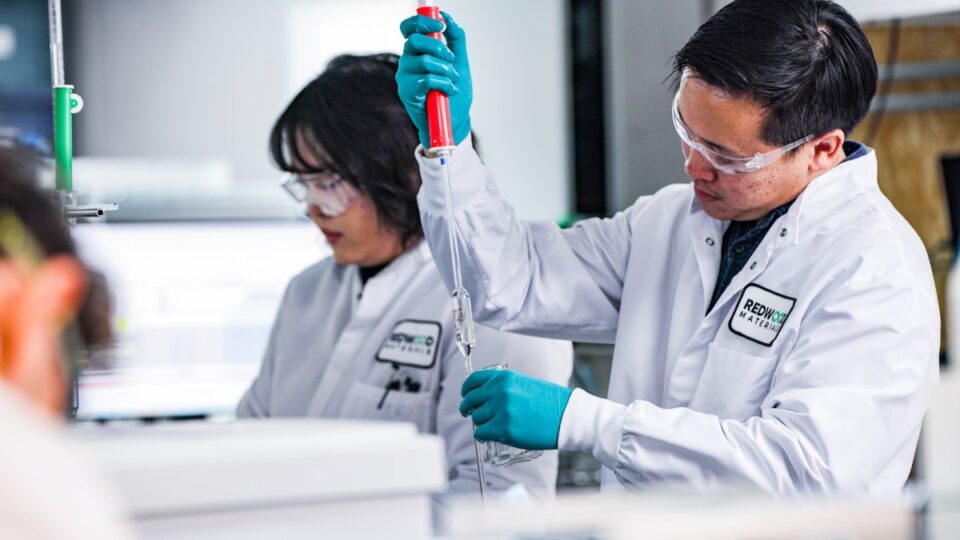Redwood Materials has been on an expansion tear in recent years — growth that has extended the lithium-ion battery recycling and materials startup’s footprint well beyond its Carson City, Nevada headquarters as it locked up deals with Toyota, Panasonic, and GM, started construction on a South Carolina factory, and made an acquisition in Europe.
And yet, Redwood Materials CTO Colin Campbell saw a gap in the company’s 1,100-person workforce. San Francisco was the answer, Campbell told TechCrunch, a longtime Tesla veteran who took the top tech spot in August 2023.
The company, which was founded by former Tesla CTO JB Straubel, is filling that gap with a new research and development center in San Francisco. The 15,000-square-foot facility located in the city’s Design District is equipped with lab space to support engineers who will eventually work on every point of the battery ecosystem, from chemical engineering and cathode science to software and electrical engineering. That work could help improve cathode production, an important component of Redwood’s business, which generated $200 million in revenue in 2024.
The center, which Redwood moved into about a week ago, only has a handful of engineers on site. But Campbell expects it will eventually employ about 50 or more people.
“We had a really good year, and we had great revenue,” Campbell said, adding that the company has been limited by its ability to expand. “And what’s limiting our ability to expand the engineering team is hiring. We just need to expand the aperture of where we can hire from. And San Francisco was sort of a logical place for a bunch of different reasons.”
High on the list is deep talent pool of hardware and software engineers who are in the Bay Area, he added.
Lithium-ion batteries contain three critical building blocks. There are two electrodes, an anode (negative) on one side and a cathode (positive) on the other. Typically, an electrolyte sits in the middle and acts as the courier to move ions between the electrodes when charging and discharging. Cathode foils, which account for more than half the cost of a battery cell, contain lithium, nickel, and cobalt. Redwood is able to capture all of those materials through its battery recycling and processing.
But Redwood aims to do more than recycle. The startup, which has raised more than $2 billion in private funds, is building an end-to-end battery ecosystem that touches the full life cycle of lithium-ion batteries at every stage, including recycling, refining, and remanufacturing as well as assessing the health and extending the life of the battery.
Campbell is particularly keen for engineers to work on equipment development for Redwood’s factories.
“A major part of why they (factories) are hard to build in the U.S. is that the U.S. doesn’t have the industrial base to make a bunch of this machinery, and in particular, to make novel and cost-effective machinery,” he said. “So novel process equipment engineering is a big piece of it.”
Engineers at the lab will also work on battery diagnostic methods to help understand the health of a battery pack, which Campbell believes could benefit another piece of the business.
“I think it’s important to start with the foundation of the business, which is battery materials, and we rest all of these other projects on top of them,” Campbell said, adding the diagnostic tools could boost the bottom line. “So if we’re receiving packs, and we diagnose it, and it actually is bad, that’s a great advantage to us to just recycle it directly — I think it could be significant.”
Campbell added that he didn’t think diagnosis would be a majority business for Redwood, but that it fits into the company’s overall ethos.
“We have this constitutional distaste for retiring things before they need to be retired,” he said. “So even if it’s not a major part of the business, it’s the right thing to do for this ecosystem. “And we would, we would do it anyway.”
Kirsten Korosec is a reporter and editor who has covered the future of transportation from EVs and autonomous vehicles to urban air mobility and in-car tech for more than a decade. She is currently the transportation editor at TechCrunch and co-host of TechCrunch’s Equity podcast. She is also co-founder and co-host of the podcast, “The Autonocast.” She previously wrote for Fortune, The Verge, Bloomberg, MIT Technology Review and CBS Interactive.
